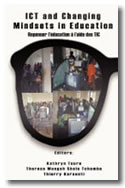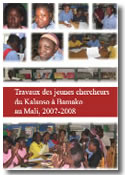What if Africa were to become the hub for global science? April 16, 2013
By Julian Siddle
BBC Radio Science Unit
At first sight, it seems unlikely – a continent most associated with war and famine producing globally significant scientific research.
However, in many ways, the groundwork is there – knowledge, ingenuity, willingness to learn and adapt, coupled with the rapid expansion of digital technology. All of this is really allowing Africa to play a major part in global scientific collaborations.
Holding development back, higher education remains poor.
Many non-governmental organisations (NGOs), churches and development agencies push basic literacy – it is a huge international industry.
But there is nothing at the higher end, very little money for tertiary education. It is quite hard to study in Africa, and encouraging talented students to leave is an industry in itself, with a large variety of academic bursaries available for study in the US and Europe.
If the limited available statistics are to be believed, there are perhaps fewer than five million students in higher education in the whole of sub-Saharan Africa – and most of those, perhaps two-thirds, are in South Africa, the wealthiest country.
Brain gain
It is a low base to start from, but the tide is turning. Real, serious scientific work is taking place now in sub-Saharan Africa, especially in maths, physics and astronomy.
Prof Justin Jonas, from the Square Kilometre Array (SKA), a collaborative international radio telescope project involving eight sub-Saharan African nations, as well as countries worldwide, says: "Africa has reached a stage of development where it has become a destination for doing world-class science – a place that has individuals, facilities and institutions that attract scientists from around the world to work on the continent.
"It has also become an attractive proposition for Africans to remain on home soil, rather than seek research opportunities abroad.
"As an example, the SKA project has resulted in a net brain gain to the region, with leading astronomers, ranging from post-doc[toral]s to research professors, choosing to work in Africa."
Similar sentiments are expressed by Prof Tejinder Virdee, a former director of the Compact Muon Solenoid (CMS) experiment, which has been at the forefront of the search for the Higgs boson at Europe’s premier particle physics lab, Cern.
Prof Virdee sees huge potential in sub-Saharan Africa for developing institutions to join in with global collaborative projects such as those pursued at Cern.
He says the search for the Higgs particle involved number-crunching on a grand scale, and that the data could have been processed anywhere with the right tools – so why not in Africa?
And from the African Institute of Mathematical Sciences (AIMS), itself an institute with strong links to the global physics community, there is the Next Einstein Initiative.
This is currently setting up centres of excellence in Africa for the mathematical sciences, and is connected to some of the most forward-thinking academics in the fields of maths and physics across the continent, as well as in Canada, the UK and the US.
Next Einstein Initiative executive director Thierry Zomahoun says: "So far, we have set up institutes in Senegal and Ghana, with more planned in Cameroon, Tanzania and Benin..
"And the idea is literally to create an environment in which an African Einstein could develop."
Perhaps the areas where Africa’s scientific contributions are most striking is in our understanding of Malaria and HIV.
The Aids epidemic has ravaged major parts of the continent, but it was research led from Africa that made the connection in the 1980s between Aids, then prevalent among homosexual men in the US, and "slim disease" in Africa. HIV was the cause of both.
Since then, Africa has seen some of the most important work in combating HIV – from demonstrating and tackling mother-to-child transmission, to research among people who appear to have immunity to the disease.
"Africa-based research has clearly contributed to the fact that in many countries there are now fewer deaths from Aids and fewer new HIV infections," said Peter Piot, the former director of UNAids.
The potential for Africa to play a big role in global science is there, but questions remain over research funding and the appropriateness of research led by foreign donors.
African solutions
Last year, the African Union set up a science and technology advisory panel to develop a more Africa-centred research and development environment.
Its co-chair, Harvard’s professor of the Practice of International Development Calestous Juma, says: "As a latecomer, Africa is entering the field of global science facing major challenges but also opportunities.
"It can build on the vast quantities of scientific and technical knowledge available worldwide to solve local problems in fields such as agriculture, water, health, education and environment.
"The strategic focus for Africa should therefore be on generating research that has immediate local use. It is through such strategies that Africa will be able to make its own unique contributions to the global scientific enterprise.
"Achieving this goal will require a focus on building a new generation of research universities that are focused on problem-solving and have direct links with enterprises and local communities.
"While the focus in industrialised countries is ‘science and technology’, Africa’s challenges call for ‘technology and science’."
Certainly, the will is there. The key issue is how significant a part ideas from Africa will play within the future of global scientific research. On this, Justin Jonas is optimistic.
"The MeerKAT radio telescope, designed and being built by South Africa as an SKA precursor, will be the most powerful instrument in its class until the construction of the SKA," he says.
"Initiatives such as the SKA and MeerKAT change the image that the world has of Africa, and perhaps more importantly, the image Africans have of their own continent."
Science Africa, a BBC science festival from Makerere University in Kampala, Uganda, runs from 24 March to 29 March. Much of the content will be broadcast on the BBC World Service. All the scientists featured in this article will be speaking at the festival.
Your comments
Africa is an exporter of talent. Every year thousands of the best and brightest students leave to study at universities in Europe and America. Every intelligent young African dreams of getting a scholarship to study abroad. The focus of governments and NGOs is very much on basic education yet if more research was done in Africa everyone would benefit. Research attracts talent and money and inspires students at all levels. Africa shouldn’t just focus on local problems but needs to aspire to be at the core of global science to stop the brain drain and make the best of its talent. Projects like the square kilometre array discussed in this BBC news item are just a start. Dave Kidd, Woldia, Ethiopia
Africa has been the birthplace of many in the science field including many doctors who are treating patients in the west. If all these talented people could be encouraged to stay home and the African governments equipped them to practice and complete their research from Africa, then we could take control of our own science. In the end progress hinges on government policy that encourages scientific innovation and research. Ambrose Kibuuka, Entebbe, Uganda
Yes, Africa should take control of its science. We have spent most of our time waiting and depending on the west to help develop Africa. This is demoralizing and has really gotten us nowhere. Why can’t we as Africans accomplish this with our own volition? Leaders all over Africa need to rebuild our African pride and the faith of young Africans in their leaders, this is one way I think they could achieve this and gain a respectable place in the world as peers. KB, Milwaukee, USA
Julian Siddle deserves much credit for writing this article. It articulates a vision that will appeal to the competence and ingenuity of many Africans. The priority to find "African solutions" would bolster and diversify national economies currently too dependent on low-wages and unhealthy jobs in mining and oil industries designed primarily to benefit foreign investors. Jens A. Jorgensen, Brabant Wallon, Belgium
I completely agree with the idea that Africa will, in the not too distant future be a hub for science development but also in other fields. We have tried here in Kampala to develop a new approach to higher education by giving professionals an opportunity to develop their skills and knowledge by studying at home or in the office. The Virtual University of Uganda, a project we started in 2011, has proved, after one year of operation, to be hugely successful. Being the first fully online institution of higher learning in sub-Saharan Africa, it has given us an opportunity to develop new methods of learning and teaching. Well done BBC for this inspiring piece and I am sure that the BBC science festival from Makerere University will be a success! Professor Michel Lejeune, Kampala, Uganda
The science discussion is long overdue. Every culture can impact on science and technology, it is up to each community to take control of their destiny. We Africans have to take a second look at education. We must develop a culture that makes things, it is from there that we’ll develop technical skills that will employ the population and power the economies. Joe Agu, Santa Clara, California, USA
There are two ways for Africa to develop its scientific potential. First, by exploiting the advantages offered by innovation. Here because of escalating research and development costs as well as shrinking budgets there is a need for solutions and products that are simple, less costly for everyday use. Secondly, we can target "knowledge outsourcing" and build a niche in that area, by undertaking to put our knowledge in solving costly processes for which knowledge costs in western economies are simply too much to sustain. Allan Okoth, Nairobi, Kenya




Interesting!! Let’s cross our fingers that all these projects work out, as well as the involvement of politicians and decision-makers for there achievement. The reflections didn’t take into account the money spent by parents for higher education of their children in Europe and America, reducing families’ savings and consequently local investment for social and economical devlopment. And so, and so on!!